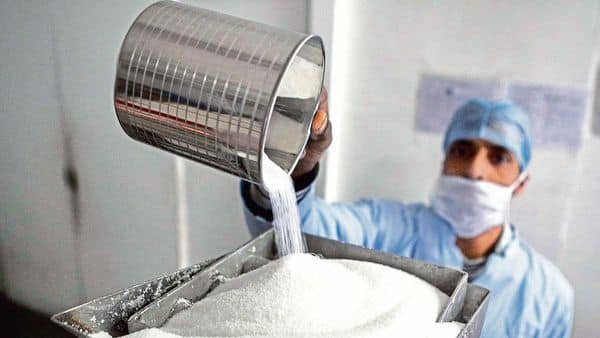The Centre on Friday rejected the sugar industry’s demand for any upward revision of the current statutory minimum selling price of ₹31/kg for the commodity as domestic (ex-mill) prices are higher. It also told the industry to move ahead from a controlled system.
“There is no need to increase the MSPof sugar as of now, as domestic prices are already at ₹34-35 per kg,” Union Food Secretary Sudhanshu Pandey said at the annual general meeting of Indian Sugar Mills Association (ISMA), responding to the industry’s demand.
Earlier, ISMA president Niraj Shirgaokar, in his address, urged that the MSP of sugar be raised to ₹36-37 per kg to cover the industry’s cost of production.
“The decision to increase the floor price of sugar from ₹31/kg, fixed in February 2019, is for some reason not getting finalised by the government. In the last almost 34 months since the price was increased to ₹31 per kilo, the price of sugarcane has been increased by the government twice… Therefore, our cost of production has increased quite substantially in this period,” Shirgaokar said.
At the new sugarcane fair and remunerative price (FRP) of ₹290 per quintal, the industry’s cost of production of sugar works out to around ₹36-37 per kg, he said.
Export market
Sugar prices (ex-mill) in Muzaffarnagar, Uttar Pradesh, fell by ₹15-20/quintal to ₹3,460 on Friday from Thursday, while in Delhi it ruled flat at ₹3,505, traders said.
Indian sugar is finding a decent market price in the domestic market as well as good price in the international market, the food secretary said. Pandey also said the MSP system was brought when the prices were falling but now prices are going up.
According to a PTI report, asked if the selling price system will remain or be scrapped, Pandey said: “It depends on international market behaviour, which country is producing how much, whether we have surplus or we have no surplus available. It depends, at the moment we don’t need MSP. Why something cannot be need-based? When it is needed, you use it. when it is not needed, don’t use it.”
“The worry is also that oil companies are not signing long term bipartite contracts with the existing ethanol producers and sugar mills, and yet they are putting us at a lower priority to the new ethanol plants which have been shortlisted by the OMCs for long term supply contracts,” Shirgaokar said.
Other demands
ISMA also continued its demand to implement revenue sharing formula on sugarcane pricing, which has been regularly raised in every AGM. Amid farmers’ demand to legally enforce the minimum support price (MSP) on crops, it is difficult for any government to withdraw a benefit like FRP for sugarcane farmers, experts said.
Pandey also said that for the current 2021-22 season, the secretary said that almost 3.5 million tonnes (mt) of sugar has already been contracted for exports. “We should touch between 5 mt and 6 mt (exports) this year,” he said, adding there is need to balance India’s sugar production as per the requirement of the global market.
Around 2 mt of sugar got diverted during 2020-21 for ethanol production and the number is likely to increase to 3.5 mt this year. By 2025, Pandey said, the target should be to divert roughly about 6 mt of sugar.
The above news was originally posted on www.thehindubusinessline.com





